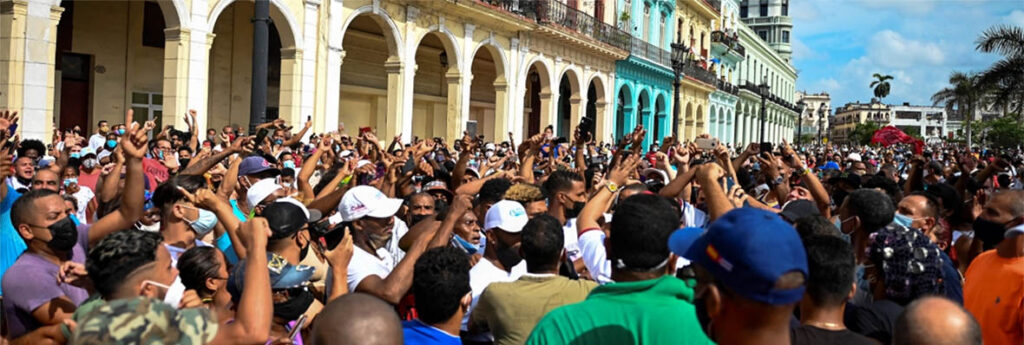Thousands of Cubans chanting “Freedom” and calling for President Miguel Diaz-Canel to step down protested in the streets of cities across the country in the biggest anti-government demonstrations in decades.
Cuba’s is experiencing the worst economic crisis since the fall of the Soviet Union, and a record surge in coronavirus infections, with people voicing anger over shortages, the pace of Covid vaccinations, curbs on civil liberties and the authorities’ handling of the pandemic.
Experts say the protests now – the largest in decades – are fuelled by increased access to internet and smartphones over the past decade.
Most protesters across Cuba found out about the rallying points over social media.
Cuban authorities are now blocking Facebook, WhatsApp, Instagram and Telegram.
The police presence in Havana was heavy even long after most protesters had gone home by the 9 p.m. curfew in place due to the pandemic.
“We are going through really difficult times,” Miranda Lazara, 53, a dance teacher, who joined the thousands of protesters who marched through Havana. “We need a change of system.”
In a televised speech, President Diaz-Canel, who heads the Communist Party, blamed the problems on the United States, which in recent years tightened its decades-old trade embargo on the island,
Diaz-Canel said protesters were sincere but manipulated by US orchestrated social media campaigns and “mercenaries” on the ground, and warned that further “provocations” would not be tolerated, calling on supporters to confront “provocations.”
Julie Chung, acting undersecretary of the US State Department’s Office of Western Hemisphere Affairs, said it was deeply concerned by “calls to combat” in Cuba and stood by the Cuban people’s right for peaceful assembly.”
In one area of Havana, protesters took out their anger on an empty police car, rolling it over and then throwing stones at it. Elsewhere, they chanted “repressors” at riot police.
Some protesters said they went on to the streets to join in after seeing what was happening on social media, which has become an increasingly important factor since the introduction of mobile internet two and a half years ago, although connections were patchy on Sunday.
Public dissident in Cuba is usually restricted but the country has seen a growing number of protests over the past year, although nothing on this scale.
Cuba has begun a mass vaccination campaign, with 1.7 million of its 11.2 million residents vaccinated to date and twice that many have received at least one shot in the three-shot process.
However, the arrival of the Delta variant has prompted cases to surge, with health authorities reporting a record 6,923 cases and 47 deaths on Sunday – twice as many as the previous week. Hospitals in the worst affected province have been overwhelmed.

